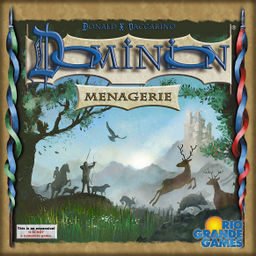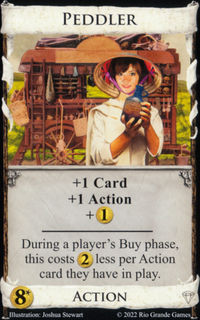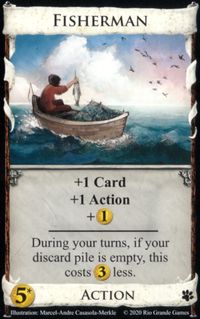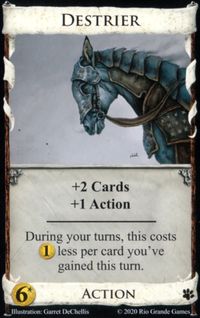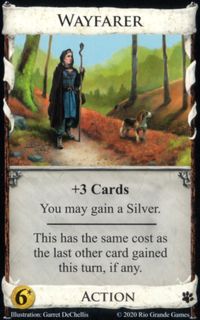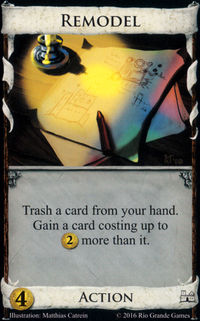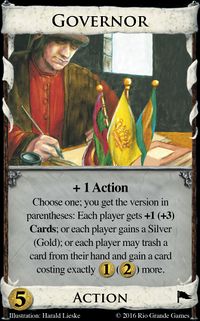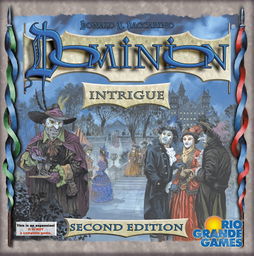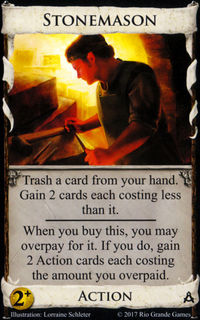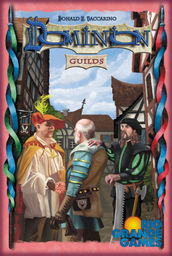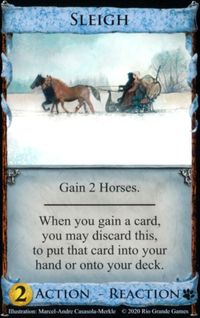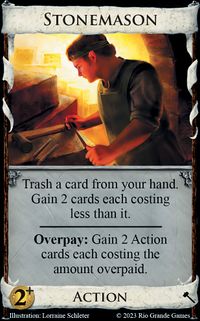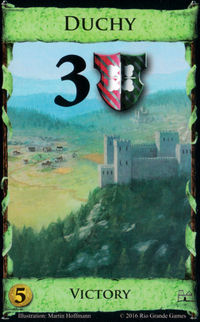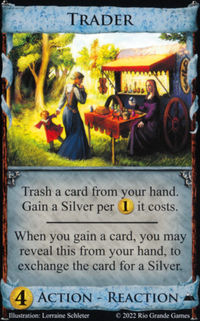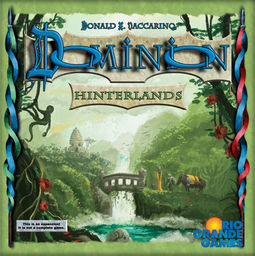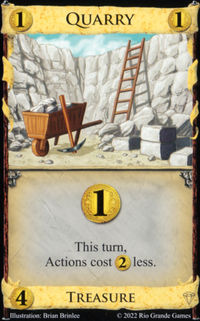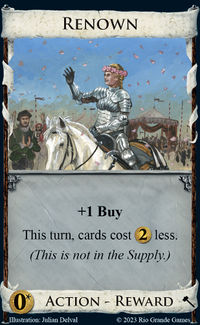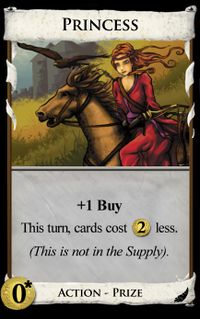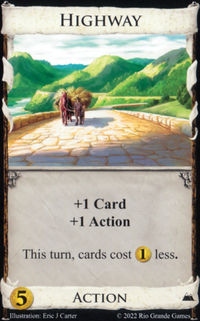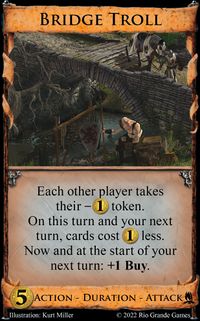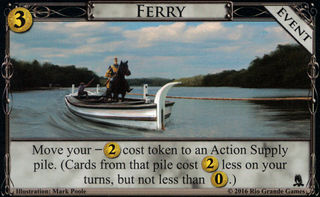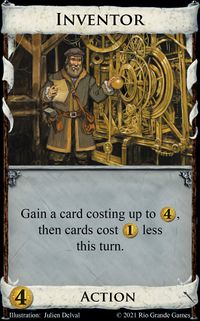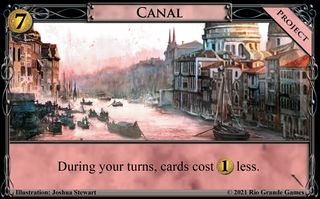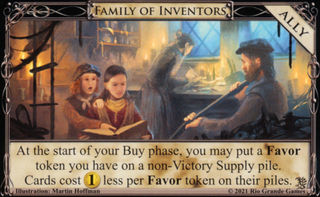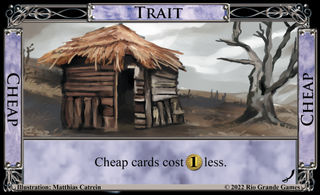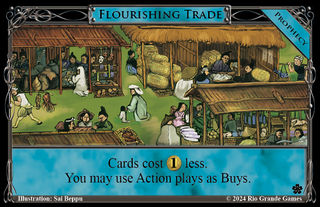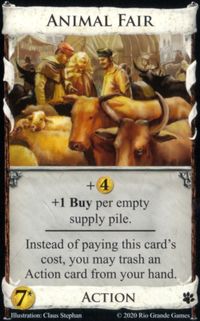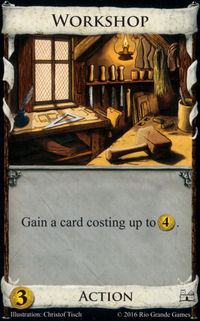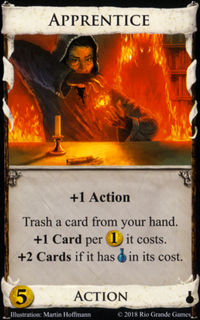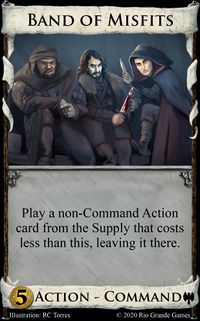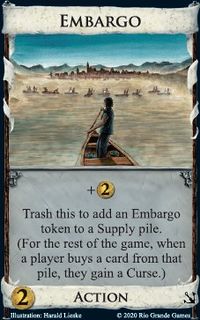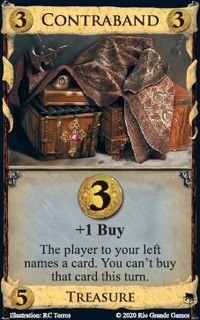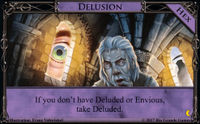Cost reduction
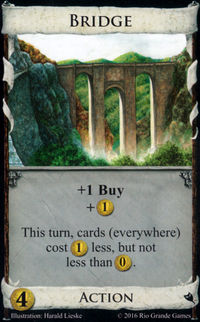
Cost reduction is a recurring mechanic in Dominion. Rather than directly fielding coin, cost-reducers decrease the cost of cards, an effect which becomes more valuable with more buys or gainers. Typical cost reduction instructions follow this wording:
- [All cards or some subset of cards] (including cards in players' hands) cost less this turn.
A general rule prevents costs from going below . Prior to the 2019 errata, the stipulation "but not less than " was included in the card text of cost reducers themselves, rather than in the general rules, and that clause was never included in any of the cards of this category in Menagerie.
Reducing a cost in does not reduce a cost in or . Reducing the cost of cards does not affect the cost of Events or Projects.
Rules
There are no official rules for cost reduction in general. But there are official rules for cards that can change their own cost, which include Peddler, Fisherman, Destrier, and Wayfarer.
- When these cards change cost, all copies of them change everywhere, for all purposes. For example, when you Remodel one of the cards, the changed cost is what matters, not the printed cost. When another player has an effect that cares what the cost of their cards is on your turn (such as the promo Governor), they use the same changed cost that you do.
- Costs cannot go below .
- [Peddler,] Destrier and Fisherman are also affected by other things that change costs, like Bridge (from Intrigue).
- Costs can change in the middle of resolving effects. The key thing is to follow card instructions in order.
- Example: You buy Stonemason (from Guilds). If you overpay and have an empty discard pile, you could gain a Fisherman, but not two copies of it, because after gaining one, Fisherman would cost . If you overpay , you could gain a Sleigh and then a Wayfarer, as Wayfarer's cost would then be . You could not gain two Wayfarers, as you have not gained the Stonemason yet - remember that "when you buy" rules happen before actually gaining the card. If you overpay , you could gain Destrier, but could not then gain a second Destrier, as Destrier would then cost .
- [With recent errata to Stonemason, this paragraph is outdated; here is an unofficial update: You buy Stonemason and overpay . Since you gain the Stonemason before gaining 2 Actions costing , Fisherman would cost and you'd be unable to gain it. If you overpay , you can gain 2 Wayfarers, as gaining the Stonemason means that Wayfarer costs . If you overpay , gaining the Stonemason means that Destrier now costs , so you can gain a copy of it, but when you do, Destrier now costs , so you can't gain a 2nd copy.]
- Example: You play Stonemason to trash a card. If you trash Gold, you could gain a Duchy, and then could gain a Destrier, since it would then cost . You could gain a Duchy and then a Wayfarer the same way. If you trash a Silver and have an empty discard pile, you could gain a Fisherman, but not a second one, as then your discard pile would have a card in it, the Fisherman you gained. If you trash a Destrier, you could first gain a Duchy, which costs less than ; then you would have to gain a card costing up to , as Destrier would now cost .
- Example: If you use Trader (from Hinterlands) to trash a Destrier, you will gain six Silvers; first it checks the cost, then you gain that many Silvers. Similarly you could trash a Wayfarer for six Silvers, and a Fisherman for two or five Silvers depending on whether or not your discard pile was empty when you trashed the Fisherman.
- These examples all assume no other gains previously in the turn. A Stonemason trashing Estate could gain two Destriers if you gained 5 other cards first; if you gain a card costing and then trash a Wayfarer to Trader, you will gain 4 Silvers since it costs then, and so on.
- Example: You buy Stonemason (from Guilds). If you overpay and have an empty discard pile, you could gain a Fisherman, but not two copies of it, because after gaining one, Fisherman would cost . If you overpay , you could gain a Sleigh and then a Wayfarer, as Wayfarer's cost would then be . You could not gain two Wayfarers, as you have not gained the Stonemason yet - remember that "when you buy" rules happen before actually gaining the card. If you overpay , you could gain Destrier, but could not then gain a second Destrier, as Destrier would then cost .
List of cost-reducers
- Bridge - the archetypal cost-reducer
- Quarry - reduces Action cards by
- Renown - reduces costs by , but only one or two copies
- Highway - cantrip
- Bridge Troll - durational cost-reducer
- Ferry - reduces a single Supply pile's cost by on your turn
- Inventor - gains a card costing up to before its cost reduction kicks in
- Canal - reduces costs on your turn for the rest of the game
- Family of Inventors - reduces cost of a supply pile of your choice, for everyone
- Cheap - reduces cost of a randomly chosen supply pile for the entire game
- Flourishing Trade - permanently provides cost reduction on everything for the rest of the game
List of cards that can change their own cost
These cards have a base cost which can be changed by something that happens during your turn. Of these, three are in the Menagerie expansion
- Peddler - cost is reduced by per Action card in play, but only during your buy phase
- Destrier - cost is reduced by the number of cards you gained on that same turn
- Fisherman - cost is reduced by if you have no cards in your discard pile
- Wayfarer - cost is equal to the cost of the last-gained card, and can even become more expensive than its base price
Animal Fair, also from Menagerie, is an odd case: it can be bought for if you trash an Action card from your hand, but its numerical cost doesn't change as part of this effect.
Strategy
Most cards that reference a specific cost in do well with cost-reducers, as most such cards use the specific cost as an upper limit. For example, Workshop can gain any card costing up to ; without cost reduction, this effect is rather weak, but with four Highways in play, a Workshop can gain Provinces. On the other hand, cards that give a scaling effect per cost in of another card (most often trash for benefit cards) will do less well with cost-reducers, as their effect will be diminished, and cards that reference a cheaper card will give no effect if their cost has been reduced to . For examples, trashing a Silver to an Apprentice when you have Princess in play will only draw you one card, and with five Highways in play, Band of Misfits can't do anything.
Since cost reduction affects cards but not Events, it is less useful for strategies that depend heavily on buying Events (or Projects).
Gallery
Cards that can reduce their own cost
Removed cards
Trivia
Cards that increase costs
Some of the issues - stacking, timing vs. cost reduction - can be solved, but the solutions take words, and you end up with something too complex. There's no special beauty to doing it that has pushed it into existence despite that.
Punishing buys is okay and there's some of that, e.g. Embargo. Contraband and Delusion try out limiting buys. And Peddler gives you the positive side, where a card costs more for your Remodels.
